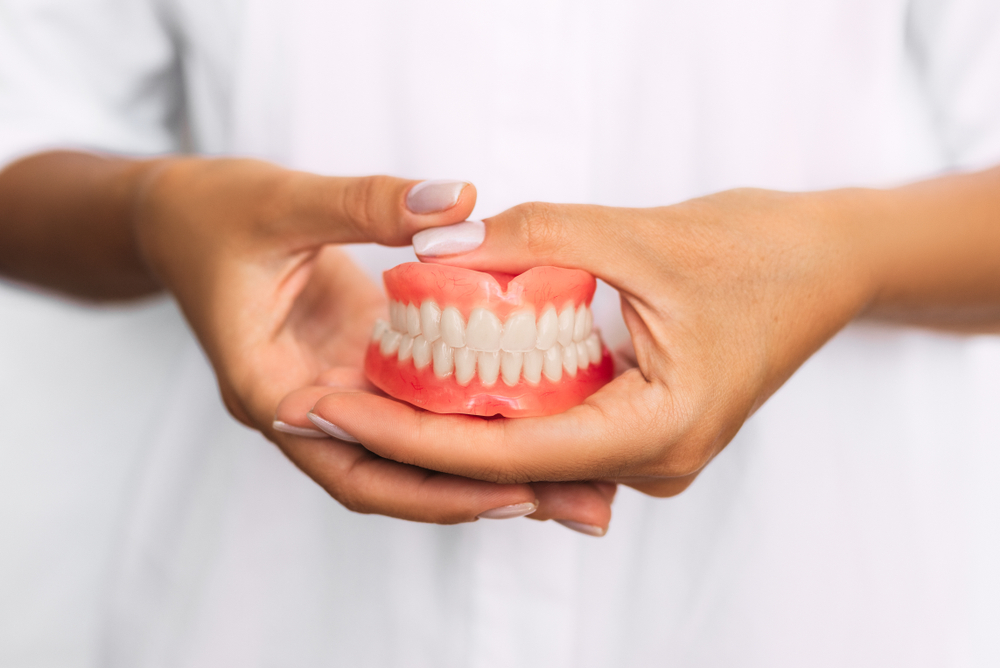

Are You Dealing With Denture Issues?
Denture wearers, we feel your struggle! Are you wrestling with loose fittings, experiencing regular discomfort, or wrestling with speech issues? Dentures can indeed be life-altering; however, when problems arise, they fundamentally disrupt our routines.
Let’s face it — denture troubles are more than just a simple nuisance. They impact how we eat, how we laugh, and most importantly, how we express our radiant smiles. However, our Staten Island dentists are here to help. We’ll walk you through some of the most common denture problems and how to fix them.
Uncomfortable Denture Fit
One of the most common issues denture wearers face is an uncomfortable fit. Ill-fitting dentures can lead to a range of problems, from sore spots and difficulty eating to slippage and speech impediments. If your dentures are causing discomfort, it’s crucial to address the issue promptly.
To improve the fit of your dentures, there are a few steps you can take.
- Make sure your dentures are properly cleaned and maintained. A buildup of food debris or bacteria can contribute to gum irritation, so cleaning them thoroughly with a soft-bristled brush and denture cleanser is essential.
- Consider using a denture adhesive or fixative. These products can help reduce movement and friction between the dentures and your gums, providing a more secure fit. Applying the adhesive according to the manufacturer’s instructions will ensure optimal results.
- Consult your dentist for professional assistance. The dentist may need to adjust or reshape the dentures to improve their fit. This process may involve careful adjustments to the model or relining to enhance comfort and stability.
Dealing with an uncomfortable denture fit requires patience and persistence. Be open with your dentist about any persistent issues or concerns you have regarding the fit of your dentures. With their expertise and guidance, you can find a solution that offers greater comfort and functionality.
Sore Jawbones
Wearing ill-fitting or improperly adjusted dentures can result in soreness in the jawbone area due to excessive pressure being exerted on certain points. This discomfort can make it difficult to eat or speak comfortably. Thankfully, there are several remedies you can try to alleviate sore jawbones caused by dentures.
- Try practicing good posture while wearing your dentures. Maintaining proper alignment of your head, neck, and spine can help distribute the pressure evenly, reducing strain on the jawbone. Refrain from biting down too forcefully or clenching your jaw, as these habits can exacerbate discomfort.
- Applying warm salt water rinses to soothe the sore areas. Mix a teaspoon of salt in a cup of warm water and rinse your mouth with this solution several times a day. The warmth and salt content can help reduce inflammation and provide temporary relief.
- Consult with your dentist. They may need to make adjustments to your denture’s fit or shape to alleviate excessive pressure on specific areas of your jawbone. A denture adhesive or fixative may also be suggested to enhance stability and reduce discomfort.
 Loose Dentures
Loose Dentures
Another common problem denture wearers face is loose dentures. This can cause discomfort, difficulty eating, and even embarrassment. The good news is that there are several ways to address this issue and improve the fit of your dentures.
If you have loose dentures, start by visiting your dentist for an evaluation. They’ll examine the fit of your dentures and determine the underlying cause of the problem. In some cases, simply adjusting the fit of your dentures may be enough to resolve the issue.
Another option is relining your dentures. Over time, changes in your jawbone and gum tissue can cause your dentures to become loose. Relining involves adding a new layer of material to the base of your dentures to improve their fit. This procedure can usually be done by your dentist in their office, and it helps ensure a more secure and comfortable fit.
In more severe cases where traditional methods prove ineffective, implant-supported dentures may be recommended. This involves placing dental implants into the jawbone, which acts as anchors for the dentures. Implant-supported dentures provide a secure and stable fit, allowing for improved function and confidence.
Stabilization Techniques
When facing the inconvenience of loose dentures, it’s crucial to know about stabilization techniques that can significantly improve your experience. These techniques aim to provide better stability and prevent denture slippage during daily activities such as eating, speaking, or laughing.
- Using adhesives or fixatives specifically designed for dentures. These products come in various forms such as creams, powders, or strips, and create a temporary bond between your gums and dentures. By applying a thin layer of adhesive onto your denture surfaces, you can enhance their grip and diminish slippage.
- Practicing good oral hygiene. Keeping your mouth clean and free from debris can minimize irritation and improve the fit of your dentures. Rinse your mouth with warm saltwater to soothe any inflammation or discomfort caused by loose dentures. Additionally, gently brushing your gums, tongue, and palate using a soft-bristled toothbrush will help stimulate blood flow and maintain oral health.
- Consult your dentist for other options such as relining or adjusting the fit of your dentures. They may recommend a professional application of adhesive or fixative during the adjustment process to ensure an optimal fit.
Denture Material Irritation
Wearing dentures for the first time can often lead to discomfort and irritation in the mouth. This common problem arises from the materials used in making dentures and their interaction with the soft tissues of the mouth.
Mouth and gum irritation can be soothed by practicing proper oral hygiene and following some simple tips. One effective method is rinsing your mouth with a warm saltwater solution multiple times a day. This helps reduce inflammation and promotes healing. Additionally, using a soft-bristled toothbrush to clean your dentures gently can prevent further irritation. However, if these measures don’t provide relief, considering alternative denture materials may be worth exploring.
Hypoallergenic Choices
If you find that your current denture material is causing persistent irritation, it might be time to consider hypoallergenic options. These materials are specifically designed to minimize allergic reactions and sensitivities, providing a more comfortable experience for denture wearers.
One such hypoallergenic material that has gained popularity is porcelain. Porcelain dentures not only offer natural aesthetics but also have the advantage of being biocompatible, reducing the risk of adverse reactions in sensitive individuals. While they may be more expensive than other materials, many people find them worth the investment due to their durability and superior aesthetic appeal.
Another option to explore is flexible resin-based dentures. Made from a softer material that adapts more easily to the shape of your gums, these dentures are less likely to cause irritation or sore spots in the mouth. They offer flexibility and comfort while maintaining good stability.
When selecting hypoallergenic choices, it’s essential to consult with your dentist as they can provide guidance based on your specific needs and budget. They’ll evaluate your oral health and determine which material would work best for you.
Shifting Dentures
One of the most common challenges denture wearers face is the constant shifting or movement of their dentures, causing discomfort and potential embarrassment. Shifting dentures can lead to difficulty eating, speaking, and even smiling with confidence.
- Ensure that your dentures have a proper fit. Ill-fitting dentures can greatly contribute to shifting and discomfort. If you notice frequent slippage or movement, consider scheduling an appointment with our dentist for a denture adjustment or reline. This simple step can make a significant difference in improving the stability of your dentures.
- Be mindful of the food you eat and how you chew it. Opting for soft foods that are cut into small pieces can minimize the force exerted on your dentures while chewing. Additionally, try to distribute chewing on both sides of your mouth to ensure balanced pressure and reduce the risk of displacing your dentures.
Ensuring Optimal Denture Grip
A secure and comfortable denture grip is essential for proper functionality and overall satisfaction while wearing dentures. Nobody wants to worry about their dentures slipping or moving out of place during important occasions or daily activities.
Here are some tips to ensure an optimal denture grip:
- Consider using a denture adhesive or fixative as recommended by your dentist. These products can provide additional stability by creating a thin layer between your gums and the denture, reducing movement and enhancing grip. Be sure to follow the instructions provided by the manufacturer and consult your dentist if you have any concerns.
- Practice proper oral hygiene is crucial for maintaining an optimal denture grip. Clean your dentures thoroughly with a soft-bristled brush and a non-abrasive cleanser daily. This helps prevent the buildup of plaque and debris that may affect the fit and grip of your dentures. It’s also important to clean your gums and remaining natural teeth to maintain overall oral health, as healthy tissues provide better support for your dentures.
Don’t Let Denture Problems Deter You
If you’re dealing with denture problems, don’t give up. Our Staten Island dentists can help you solve your denture problems and ensure you have a complete and beautiful smile. Contact our dental team today to learn more.


 Loose Dentures
Loose Dentures